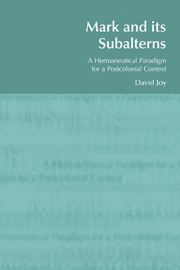1 - General Introduction
Summary
“Can the Subaltern Speak?” was a groundbreaking question posed by Gayathri Chakravorthy Spivak in 1985 in connection with the voices and struggles of the marginalized and the neglected in society. Similarly, in this study it is proposed to pose the questions: Can the Subalterns and Marginalized in Mark's Gospel Speak? and, What is their role and impact in shaping the Gospel? The identity and the function of the marginalized in Mark will be debated and the results are expected to lead the study to develop a hermeneutical paradigm for the postcolonial Indian context.
During the recent past, many New Testament readers have sought to address the problem of the marginalized persons and communities in the Gospel of Mark. Since the 1970s India has witnessed many endeavours in hermeneutics in tune with explorations from the social and political viewpoints which seemed to define the identity of the marginalized in Mark. Although fresh investigations in both Markan studies and hermeneutics have brought tremendous insights in terms of a liberative use of the Bible, much work needs to be done from the postcolonial context for employing a hermeneutical paradigm for the context of the researcher. The researcher is a product of postcolonial India and has undergone different kinds of struggles due to the colonial and neocolonial power dynamics.
- Type
- Chapter
- Information
- Mark and its SubalternsA Hermeneutical Paradigm for a Postcolonial Context, pp. 1 - 8Publisher: Acumen PublishingPrint publication year: 2008



